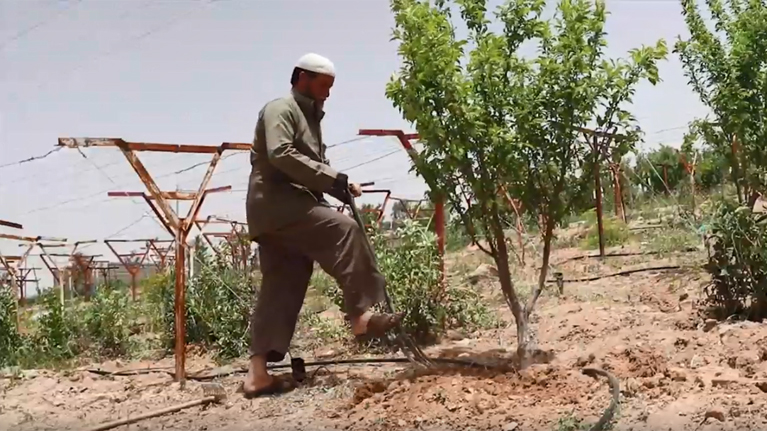Infrastructure and productivity in Jordan
Supporting farmers in water-scarce Jordan through ILO’s labour-intensive approach
An ILO project in Jordan supports hundreds of local farmers with the construction of rainwater cisterns to help improve infrastructure and agricultural productivity.
AL EES, Jordan (ILO News) ‒ Kifah Khreisat, a farmer from the southern Jordanian town of Al Ees, in the Tafilah Governorate, grows his own fruit and vegetables to support his wife and five children.
He grows everything, including cucumbers, tomatoes, pepper plants, olive, fig and apricot trees. He says that he learned the ins and outs of farming as a child, and he is now teaching his children.
“Farming is something that was passed on to me, and now I am passing it on to my children… it requires a lot of patience, years of hard work and caring for your farm,” Khreisat said.
Yet, trying to find sufficient ways to irrigate vegetation in a water-poor country like Jordan is a challenge, and something that Khreisat had struggled with for many years.
“All of Jordan suffers from water scarcity and farmers suffer from this problem too,” Khreisat said. “Here, in mountainous regions, we rely on rainwater. We only have rainwater.”
He says that building a water cistern requires a lot of capital, something that, as a modest farmer, he does not have. He tried to construct a make-shift pool to collect rainwater in the winter season, to help him get by during the scorching hot and dry summer months.
“I dug a hole and put a plastic cover on it (to collect rainwater). I worked on this for a year. But it had its negative consequences. The water would evaporate because it was an open pool and birds would drink from it and fall in. We used to get rats. Insects would fall in the water. This would block the irrigation pipes.”

However, in 2017 Khreisat became involved with an ILO labour-intensive development initiative that supported him in building a rainwater harvesting cistern to help him meet the needs of his farm. “They supported me in constructing a closed water tank to collect water. It was a great project, I benefited a lot from it.”
The initiative was part of a Norwegian-funded ILO Employment Intensive Investment Programme (EIIP) project, which helps Syrian refugees and Jordanian workers access short-term decent employment in the agricultural sector. In addition to job generation, the project directly supports farmers to enhance their overall productivity by improving their local infrastructure through the use of employment-intensive methods.
While Khreisat says that he still partly relies on his local municipality for water, the new cistern has helped him increase produce yields and save money and water. It has also made it possible for him to extend a simple drip irrigation system, which he built and paid for himself.
The agriculture sector in Jordan is an important source of income for different groups of society, including vulnerable Jordanians, migrant workers and refugees, and this is why we are implementing EIIP projects that link decent work opportunities with improved infrastructure."
Maha Kattaa, ILO Regional Resilience and Crisis Response Specialist
The initiative did not only support Khreisat but also members of the local community and Syrian refugees who were employed on his farm to complete the work. “It took two months to construct the water tank. We brought in workers, both Jordanians and Syrians, to help construct the cistern. They worked professionally. We’ve had this for two years now and we haven’t faced any leakage or problems with it.”
Improving infrastructure and productivity
The ILO project supported more than 263 farms in constructing rainwater harvesting cisterns between 2016 and 2018.A new ILO assessment, which looked at the impact of rainwater harvesting cisterns on the livelihoods of farmers, found that 72 per cent of the farmers interviewed increased the cultivated area on their farms after constructing water cisterns, with 30 per cent of the farmers saying they saved more than 40 per cent on irrigated water costs. In addition, 69 per cent of farmers saw their income increase after cistern construction, and 65 per cent of the farmers employed more workers on their farms, including family members, Jordanian and Syrian refugees and migrant workers.
“The agriculture sector in Jordan is an important source of income for different groups of society, including vulnerable Jordanians, migrant workers and refugees, and this is why we are implementing EIIP projects that link decent work opportunities with improved infrastructure,” said Maha Kattaa, ILO Regional Resilience and Crisis Response Specialist. “We have seen how supporting local farmers in finding simple yet effective methods to irrigate their farms has a positive impact on their overall productivity and livelihoods, as well as the livelihoods of those around them, through job creation, hence promoting better living conditions for all involved.”
The project, Job creation for Syrian refugees and Jordanian host communities through green works in agriculture and forestry, has benefited thousands of Jordanian and Syrian women and men, including persons with disabilities, in a number of areas across Jordan.